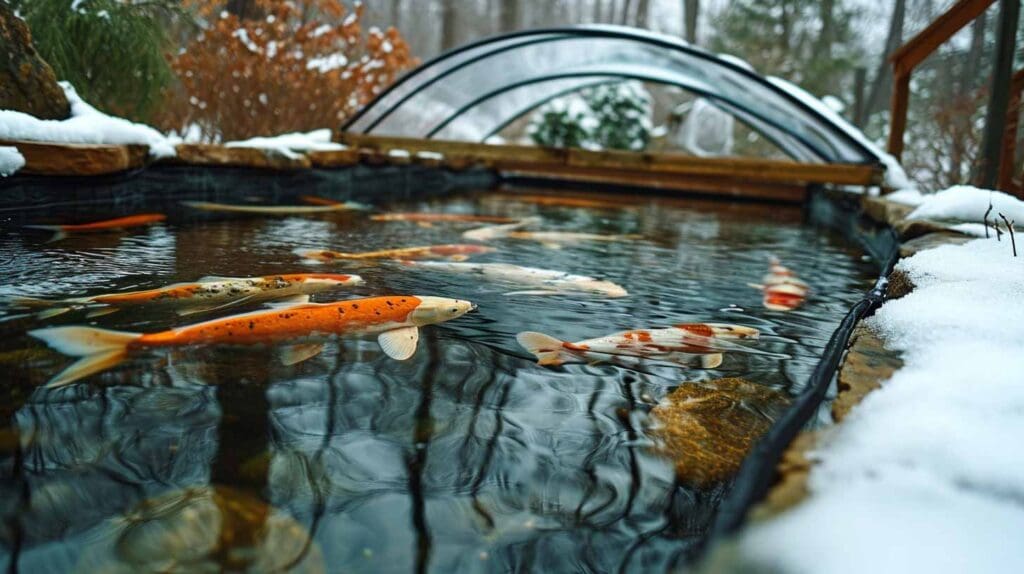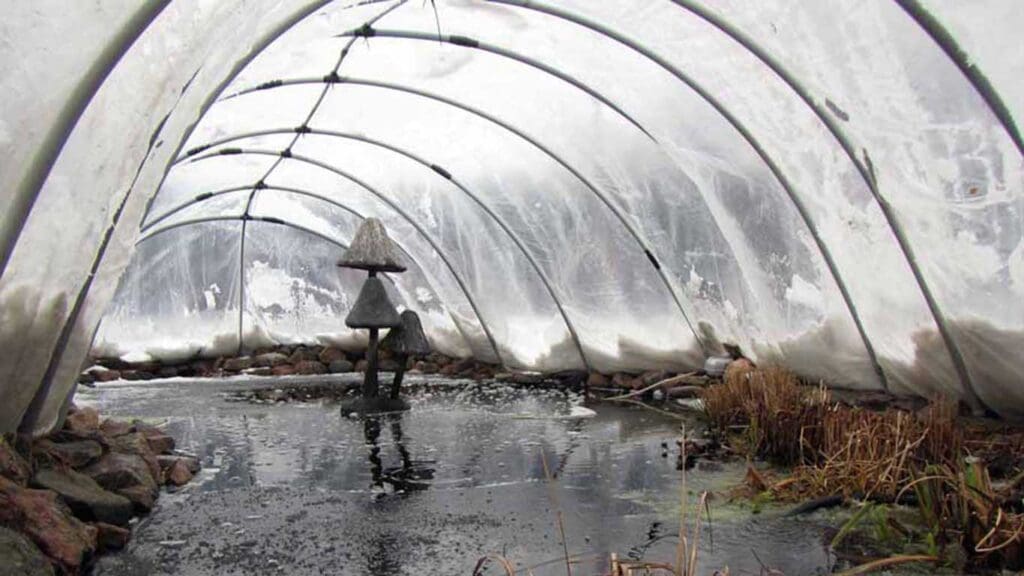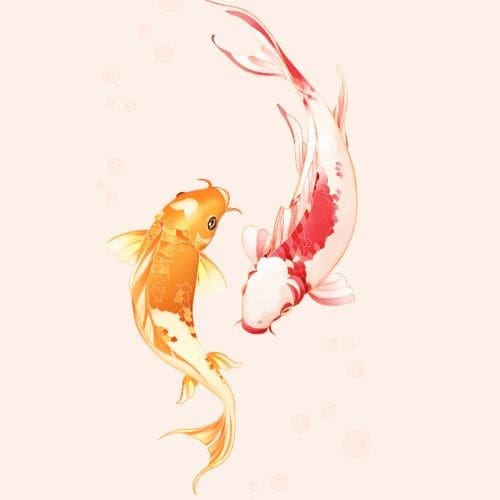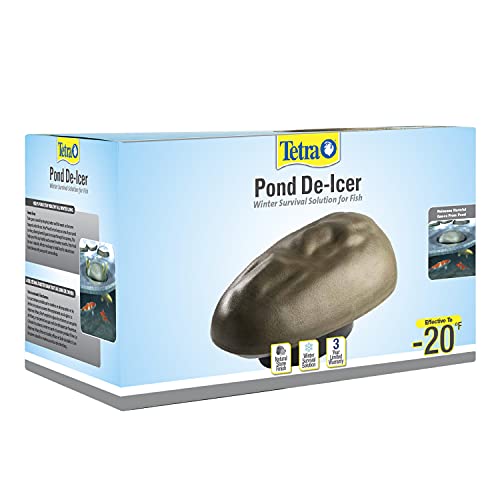If you’re an outdoor pond owner who loves koi fish, you may be wondering if your beloved pets can survive the winter. The answer is yes, but only if you take the necessary precautions, such as preparing your outdoor pond for winter and maintaining it during this period, to ensure their survival. Koi fish are cold-blooded creatures, meaning they rely on the temperature of their environment to regulate their body temperature. Therefore, when the temperature drops, their metabolism slows down, and they become less active.
Understanding koi fish biology is essential to ensuring their survival in the winter. During this time, their immune system weakens, making them more susceptible to diseases. Additionally, prolonged exposure to cold water can cause their organs to shut down, leading to death. Therefore, it’s essential to prepare your outdoor pond for the winter and maintain it during this period to prevent any adverse effects on your koi fish. Can Koi Fish Survive Winter in an Outdoor Pond? Take the necessary steps to protect these cold-blooded creatures and enjoy their beauty all year round.
Can Koi Fish Survive Winter in Outdoor Pond- Core insghts:
By following these tips and taking the necessary precautions, you can help ensure that your koi fish survive the winter and emerge healthy and happy in the spring.
Understanding Koi Fish Biology
Koi fish are a type of carp that are bred for their beautiful colors and patterns. They are a popular addition to outdoor ponds and water gardens, but many pond owners wonder if their koi fish can survive the winter months. Understanding the biology of koi fish can help you provide the best care for your fish year-round.
Temperature Tolerance
Koi fish are cold-blooded, which means their body temperature is regulated by the temperature of their environment. They are capable of surviving in a wide range of temperatures, but their metabolism slows down as the water temperature drops. This means that they require less food and oxygen in colder water.
Oxygen Needs
Even in cold water, koi fish require oxygen to survive. In outdoor ponds, the surface of the water can freeze over, which can cut off the fish’s access to oxygen. To prevent this, it is important to provide some access to the air at the water’s surface. This can be accomplished by installing a pond deicer, aerator, or running water feature.


Feeding Habits
As the water temperature drops, koi fish become less active and require less food. Overfeeding your fish in colder water can lead to health problems, so it is important to adjust your feeding habits accordingly. A good rule of thumb is to feed your fish only what they can consume in five minutes or less, once or twice a day.
Hibernation
In the wild, koi fish hibernate during the winter months. They bury themselves in the mud at the bottom of ponds and lakes, where they can survive without food or oxygen for several months. In outdoor ponds, koi fish do not hibernate in the same way, but they do become less active and require less food and oxygen.
Final Remarks
Understanding the biology of koi fish can help you provide the best care for your fish year-round. Koi fish are capable of surviving in a wide range of temperatures, but their metabolism slows down as the water temperature drops. They require oxygen to survive, even in cold water, and their feeding habits should be adjusted in colder temperatures. By providing the right conditions for your koi fish, you can help them thrive in your outdoor pond.
Winter Impact on Koi Fish
During the winter months, the temperature of your outdoor pond can drop significantly, which can have a significant impact on your koi fish. As cold-blooded creatures, koi fish are highly dependent on their environment to regulate their body temperature. Therefore, it is essential to take necessary steps to ensure that your koi fish can survive the winter in your outdoor pond.


One of the most significant concerns during the winter months is the risk of the pond water freezing over. If the water in your pond freezes entirely, it can be extremely harmful to your koi fish. As the water freezes, it can trap toxic gases that can build up and lead to suffocation of your fish.
To prevent this from happening, you should ensure that your pond has enough depth to allow your koi fish to safely tuck themselves under the ice. According to The Spruce Pets, a general rule of thumb is to have a pond depth of at least 3 feet. This depth will provide enough space for your fish to swim freely and stay safe under the ice.
Another concern during the winter months is the effect of cold temperatures on your koi fish’s metabolism. As the temperature drops, the metabolism of your koi fish slows down, leading to a reduction in their biochemical reactions. This reduction in metabolism can cause your koi fish to become less active and move less, leading to stiffness in their joints.
To help your koi fish survive the winter, you should monitor the water temperature regularly. Koi fish can survive in temperatures as low as 40°F (4°C), according to Trickyfish. Therefore, you should aim to keep the water temperature above this threshold by using a pond heater or other heating devices.
Overall, the winter months can be a challenging time for your koi fish. However, with proper care and attention, you can help your fish survive the winter in your outdoor pond. By ensuring that your pond has enough depth and monitoring the water temperature regularly, you can help your koi fish stay healthy and active throughout the winter season.
Outdoor Pond Conditions in Winter
When winter comes, it is important to ensure that your outdoor pond is prepared for the colder temperatures. Koi fish can survive in outdoor ponds during winter if certain conditions are met.


Water Depth
One of the most important factors to consider is the depth of your pond. If your pond is at least four feet deep, it can provide a suitable environment for koi fish to survive winter. This is because the deeper water will be less affected by the colder temperatures at the surface.
Water Quality
Maintaining good water quality is crucial for the survival of koi fish during winter. Ensure that the water is clean and free from any debris or dead leaves that may have fallen into the pond. Dead leaves can cause a buildup of organic material which can lead to poor water quality and harmful toxins.
Water Temperature
Koi fish are cold-blooded and their metabolism is affected by the water temperature. During winter, the water temperature in your pond will decrease, and the metabolism of your koi fish will slow down. This means that they will require less food and will be less active.


Smart Pond Thermometer with Transformer
Insulation
Insulating your pond is essential to prevent the water from freezing into a solid block of ice. Surface freezing is fine for most ponds, but you should ensure that your koi fish have enough room to safely tuck themselves under the ice. You can use a pond heater or aerator to keep a hole in the ice and allow for gas exchange.
Feeding
During winter, koi fish will require less food as their metabolism slows down. Overfeeding can lead to poor water quality and harmful toxins. You should feed your koi fish a high-quality, low-protein food that is specifically designed for winter feeding.
By ensuring that your outdoor pond meets these conditions, your koi fish can survive winter and thrive in their natural environment.
Koi Fish Survival Strategies
If you have an outdoor pond with Koi fish, it’s important to take steps to ensure their survival during the winter months. Here are some strategies that can help:
1. Keep the pond deep
Koi fish need a pond that is at least 4 feet deep to survive the winter. The deeper the pond, the more stable the water temperature will be, which is essential for the survival of your fish.


2. Keep the water quality excellent
Make sure the water in your pond is free of organic debris and has good water quality. Poor water quality can cause stress to your fish and make them more susceptible to disease.
3. Provide air holes in the ice
During the winter months, the surface of your pond may freeze over. It’s important to provide air holes in the ice to allow for gas exchange. Without air holes, your fish can suffocate.
4. Do not feed your fish
During the winter months, your Koi fish will become less active and require less food. Feeding them can cause health problems and even death. It’s best to stop feeding your fish once the water temperature drops below 50°F (10°C).
5. Consider a pond heater
If you live in a particularly cold area, you may want to consider using a pond heater to keep the water temperature stable. A pond heater can also prevent the surface of your pond from freezing over completely.
By following these strategies, you can help ensure that your Koi fish survive the winter months in your outdoor pond.
Essential Preparations for Winter
If you have an outdoor pond with koi fish, it’s important to prepare for winter to ensure their survival. Here are some essential preparations you should make:
1. Clean the Pond
Before winter arrives, it’s important to clean your pond thoroughly to remove any debris or waste. This includes removing any leaves or plants that have fallen into the water. If you don’t do this, the waste will decompose and release harmful gases, which can be deadly for your koi fish.


Get Advice from a Koi Pond Expert – Join our KPE Community!
2. Check Water Quality
Water quality is critical for the health of your koi fish, especially during the winter months when they are more vulnerable. Test the water to ensure that the pH, ammonia, and nitrite levels are within the acceptable range. If they are not, take steps to correct the water quality before winter arrives.
3. Provide Adequate Aeration
During the winter, the water in your pond can become stagnant, which can lead to a lack of oxygen. This can be deadly for your koi fish. To prevent this, provide adequate aeration by installing an air pump or fountain. This will help to keep the water oxygenated and circulating, which will promote the health of your fish.
4. Add a Pond Heater
In colder climates, the water in your pond can freeze over during the winter months. This can be deadly for your koi fish, as they need access to oxygen. To prevent this, add a pond heater to keep the water from freezing over.
Tetra Pond De-Icer, Winter Survival Solution For Fish
5. Reduce Feeding
During the winter months, your koi fish’s metabolism slows down, and they require less food. Overfeeding them can lead to health problems, so it’s important to reduce their feeding. Feed them only what they can eat in five minutes, once a day.
By taking these essential preparations, you can ensure that your koi fish survive the winter in your outdoor pond.


Maintaining the Pond During Winter
To ensure that your koi fish survive winter in an outdoor pond, you need to maintain the pond. Here are some tips to help you:
- Remove debris: Before winter sets in, remove all debris such as leaves, twigs, and other organic matter from the pond. This will help to maintain good water quality during winter.
- Reduce feeding: As the temperature drops, the metabolism of koi fish slows down, and they require less food. Reduce the amount of food you give them to prevent overfeeding, which can lead to poor water quality.
- Check water quality: During winter, it is essential to check the water quality of your pond regularly. Use a test kit to check pH, ammonia, nitrite, and nitrate levels. If any of these levels are high, take corrective action immediately.
- Add beneficial bacteria: Adding beneficial bacteria to your pond can help to break down organic matter and prevent the buildup of harmful substances such as ammonia and nitrite. Use a bacterial product specifically designed for winter use.
- Install a pond heater: A pond heater can help to maintain a stable water temperature during winter. It can prevent the pond from freezing over and ensure that your koi fish have access to oxygen.
- Use a pond cover: Covering your pond with a net or cover can help to prevent debris from falling in and contaminating the water. It can also help to prevent predators from attacking your fish.
By following these tips, you can maintain your pond during winter and ensure that your koi fish survive.


Post-Winter Care for Koi Fish
Now that winter has passed, it’s time to take care of your koi fish and prepare them for the warmer months ahead. Here are some tips to ensure your koi fish are healthy and thriving after the winter season:
- Check for any damage: Before you do anything else, inspect your pond and check for any damage caused by the winter weather. Look for cracks, leaks, or other issues that may have developed during the colder months. If you find any damage, make sure to repair it before adding any new fish to the pond.
- Gradually increase feeding: During the winter, koi fish eat less and may even stop eating altogether. As the weather warms up, gradually increase their feeding to avoid overfeeding and causing health issues. Start with small amounts and increase as the water temperature rises.
- Monitor water quality: After a long winter, your pond’s water quality may have deteriorated. Test the water regularly to ensure proper pH levels, ammonia, and nitrate levels. If needed, add beneficial bacteria to help break down any waste or debris in the water.
- Add new plants: Adding new plants to your pond can help improve water quality and provide shade for your fish during the hotter months. Make sure to choose plants that are safe for koi fish and won’t harm them.
- Keep an eye on your fish: As the weather warms up, your koi fish may become more active. Keep an eye on them for any signs of illness or injury, such as lethargy, loss of appetite, or abnormal behavior. If you notice any issues, consult with a veterinarian or koi fish expert.
By following these tips, you can ensure that your koi fish are healthy and thriving after the winter season. With proper care and attention, your fish can live long, happy lives in your outdoor pond.
Potential Risks and Solutions
When it comes to keeping Koi fish in an outdoor pond during winter, there are several potential risks to consider. However, with proper planning and care, these risks can be minimized. Here are some of the risks and solutions to help your Koi fish survive the winter months.
Risk: Low Oxygen Levels in the Pond
As the temperature drops, the oxygen levels in the pond can decrease, which can be fatal for Koi fish. To avoid this, make sure to clear out any waste from trees, leaves, and other contaminants before the water reaches 15⁰C. This will help to maintain good water quality and ensure that your Koi have enough oxygen to survive.


Risk: Overstocking the Pond
Overstocking the pond can lead to a lack of oxygen and an increase in ammonia levels, which can cause stress and disease in Koi fish. Make sure to keep the number of Koi in your pond at a reasonable level, based on the size of your pond and the filtration system you have in place.
Risk: Freezing Water
In colder climates, the water in outdoor ponds can freeze, which can be deadly for Koi fish. To prevent this, make sure that your pond is at least four feet deep, and that there are air holes in the ice to allow for oxygen exchange. You can also use a pond heater or de-icer to keep the water from freezing solid.
Risk: Poor Water Quality
Poor water quality can be a major risk for Koi fish, especially during the winter months when they are less active. To maintain good water quality, make sure to remove any organic debris from the pond, such as leaves and dead plants. You should also test the water regularly and make any necessary adjustments to the pH, ammonia, and nitrate levels.
Risk: Disease
Koi fish are more susceptible to disease during the winter months when their immune systems are weaker. To minimize this risk, make sure to maintain good water quality, avoid overfeeding your fish, and keep the pond well-aerated. You can also use a pond heater or de-icer to keep the water temperature stable, which can help to prevent stress and disease in your Koi fish.
By taking these precautions, you can help your Koi fish survive the winter months and thrive in your outdoor pond.


Get the Information You Need Direct from Koi Pond Experts
Join Now!
Final Remarks
In brief, keeping koi fish in an outdoor pond during winter can be challenging but possible with the right preparation and care. You need to ensure that the pond is at least four feet deep, has airholes in the ice, and is free of organic debris. Additionally, you need to feed the right food as the weather cools and maintain excellent water quality.
It’s important to note that if the pond freezes solid in winter, the koi fish can die. Therefore, it’s crucial to monitor the pond’s water temperature and take steps to prevent it from freezing solid. You can use pond heaters or de-icers to keep the water from freezing.
Lastly, it’s essential to prepare the pond for winter by cleaning it thoroughly and removing any debris that can cause problems. You can also add beneficial bacteria to the pond to help break down any organic matter before winter sets in.
Overall, with proper care and preparation, koi fish can survive the winter in an outdoor pond. By taking the necessary steps, you can ensure that your koi fish remain healthy and happy throughout the winter months.
Frequently Asked Questions
How long can koi fish survive winter in outdoor ponds?
Koi fish can survive winter in outdoor ponds as long as the pond is deep enough and the water does not freeze completely. Koi fish have been known to survive in water temperatures as low as 35°F (1.6°C) for short periods of time. However, it is important to take proper precautions to ensure that your koi survive the winter.
How deep should a koi pond be for winter?
A koi pond should be at least 3 feet (0.9 meters) deep to ensure that the water does not freeze completely. This depth will also provide enough space for the koi to hibernate and survive the winter.
Heating Koi pond in winter: is it necessary?
Heating a koi pond in winter is not necessary if the pond is deep enough and the water does not freeze completely. However, if you live in an area with extremely cold temperatures, you may want to consider using a pond heater or de-icer to prevent the water from freezing completely.
Can koi survive being frozen?
Koi fish can survive being frozen as long as the ice does not completely cover the pond. If the ice completely covers the pond, it can prevent oxygen from getting into the water, which can be fatal for the koi. It is important to keep a small area of the pond free from ice so that oxygen can get into the water.
What temperature can koi fish live in?
Koi fish can live in a wide range of temperatures, but they prefer water temperatures between 65°F (18°C) and 75°F (24°C). During the winter, koi fish can survive in water temperatures as low as 35°F (1.6°C) as long as the pond is deep enough and the water does not freeze completely.
What do I do with my koi pond in the winter?
In the winter, it is important to prepare your koi pond for the cold temperatures. This includes removing any debris from the pond, covering the pond with a net to prevent leaves from falling in, and ensuring that the water is deep enough to prevent freezing. You may also want to consider using a pond heater or de-icer to prevent the water from freezing completely.
 1 (509) 228-8646
1 (509) 228-8646




